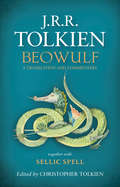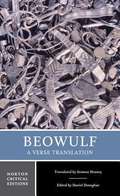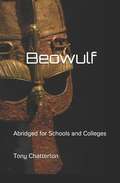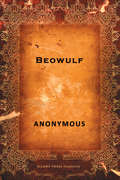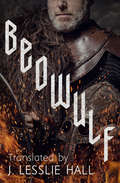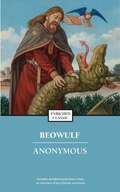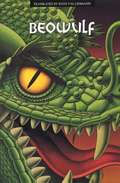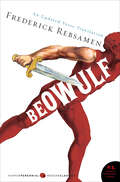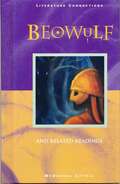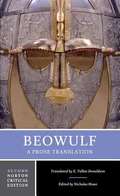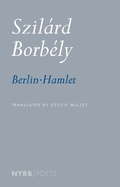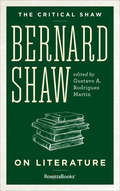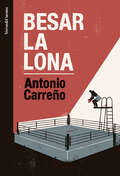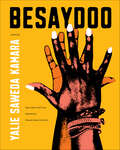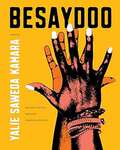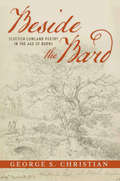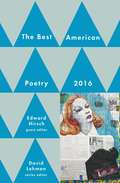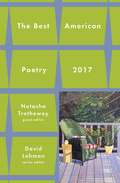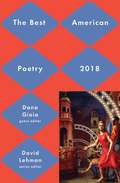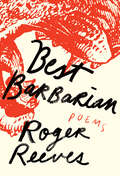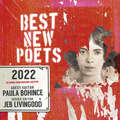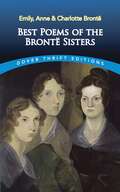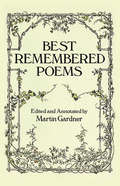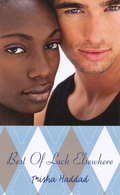- Table View
- List View
Beowulf: A Translation And Commentary
by J. R. R. Tolkien Christopher TolkienThe translation of Beowulf by J.R.R. Tolkien was an early work, very distinctive in its mode, completed in 1926: he returned to it later to make hasty corrections, but seems never to have considered its publication. This edition is twofold, for there exists an illuminating commentary on the text of the poem by the translator himself, in the written form of a series of lectures given at Oxford in the 1930s; and from these lectures a substantial selection has been made, to form also a commentary on the translation in this book. From his creative attention to detail in these lectures there arises a sense of the immediacy and clarity of his vision. It is as if he entered into the imagined past: standing beside Beowulf and his men shaking out their mail-shirts as they beached their ship on the coast of Denmark, listening to the rising anger of Beowulf at the taunting of Unferth, or looking up in amazement at Grendel's terrible hand set under the roof of Heorot. But the commentary in this book includes also much from those lectures in which, while always anchored in the text, he expressed his wider perceptions. He looks closely at the dragon that would slay Beowulf "snuffling in baffled rage and injured greed when he discovers the theft of the cup"; but he rebuts the notion that this is "a mere treasure story", "just another dragon tale". He turns to the lines that tell of the burying of the golden things long ago, and observes that it is "the feeling for the treasure itself, this sad history" that raises it to another level. "The whole thing is sombre, tragic, sinister, curiously real. The 'treasure' is not just some lucky wealth that will enable the finder to have a good time, or marry the princess. It is laden with history, leading back into the dark heathen ages beyond the memory of song, but not beyond the reach of imagination." Sellic spell, a "marvellous tale", is a story written by Tolkien suggesting what might have been the form and style of an Old English folk-tale of Beowulf, in which there was no association with the "historical legends" of the Northern kingdoms.
Beowulf: A Translation and Commentary
by J.R.R. TolkienNew York Times bestseller“A thrill . . . Beowulf was Tolkien’s lodestar. Everything he did led up to or away from it.” —New Yorker J.R.R. Tolkien completed his translation of Beowulf in 1926: he returned to it later to make hasty corrections, but seems never to have considered its publication. This edition includes an illuminating written commentary on the poem by the translator himself, drawn from a series of lectures he gave at Oxford in the 1930s. His creative attention to detail in these lectures gives rise to a sense of the immediacy and clarity of his vision. It is as if Tolkien entered into the imagined past: standing beside Beowulf and his men shaking out their mail-shirts as they beach their ship on the coast of Denmark, listening to Beowulf’s rising anger at Unferth’s taunting, or looking up in amazement at Grendel’s terrible hand set under the roof of Heorot. “Essential for students of the Old English poem—and the ideal gift for devotees of the One Ring.” —Kirkus
Beowulf: A Verse Translation
by Seamus Heaney Daniel DonoghueThe translation that "rides boldly through the reefs of scholarship" (The Observer) is combined with first-rate annotation. No reading knowledge of Old English is assumed. Heaney's clear and insightful introduction to Beowulf provides students with an understanding of both the poem's history in the canon and Heaney's own translation process.
Beowulf: Abridged For Schools And Colleges
by Tony ChattertonBeyond the desolate moors and marshes is Hrothgar's lighted hall, holding out against the encroaching dark. A mead-hall revered by all Norsemen, until one night Grendel, the fen-demon, bursts through the door.Beowulf is an epic Anglo-Saxon poem which is both subtle and savage. For many English speakers it is the first great epic, one that brings vividly to life their forefathers and their love of adventure.This abridged version of the epic poem is based upon two authoritative translations of the Nowell Codex manuscript. Digressions and genealogies (apart from Hrothgar's) have been removed, leaving a clear narrative that focuses on the character of Beowulf and the events surrounding him.The translation has been written for the classroom and for the would-be Anglo-Saxon scholar wanting an accessible introduction to the poem. It includes a guide to the characters, the history of the poem, a brief summary, a simplified prose version and activities for the classroom.
Beowulf: An Anglo-Saxon Epic Poem
by Anonymous John Lesslie HallComposed toward the end of the first millennium, Beowulf is the elegiac narrative of the adventures of Beowulf, a Scandinavian hero who saves the Danes from the seemingly invincible monster Grendel and, later, from Grendel's mother. He then returns to his own country and dies in old age in a vivid fight against a dragon. The poem is about encountering the monstrous, defeating it, and then having to live on in the exhausted aftermath.
Beowulf: An Anglo-saxon Epic Poem
by AnonymousSet in sixth-century Scandinavia, this epic poem recounts a hero&’s battles against horrific monsters. Hrothgar, the king of the Danes, finds his domain threatened by the beast Grendel. Miraculously, a hero from the Geats seafaring tribe, Beowulf, arrives and slaughters Grendel, saving the Danes. Yet nearly as soon as Grendel is slain, Beowulf must face another foe: Grendel&’s mother. This millennium-old work of literature tells of Beowulf&’s fierce fights during his fifty-year rule over his people—as well as his ultimate battle against a fire-breathing dragon who has wreaked chaos and destruction upon the Geats. This famous and powerful scene was the first appearance of a dragon-slayer in English literature.
Beowulf: An Anglo-saxon Epic Poem (Enriched Classics)
by Anonymous<P>The story of one man's triumph over a legendary monster, Beowulf marks the beginning of Anglo-Saxon literature as we know it today. <P>This Enriched Classic includes: <br>• A concise introduction that gives readers important background information <br>• A timeline of significant events that provides the book's historical context <br>• An outline of key themes and plot points to help readers form their own interpretations <br>• Detailed explanatory notes <br>• Critical analysis and modern perspectives on the work <br>• Discussion questions to promote lively classroom and book group interaction <br>• <P>A list of recommended related books and films to broaden the reader's experience Enriched Classics offer readers affordable editions of great works of literature enhanced by helpful notes and insightful commentary. <P>The scholarship provided in Enriched Classics enables readers to appreciate, understand, and enjoy the world's finest books to their full potential. Series edited by Cynthia Brantley Johnson
Beowulf: An Imitative Translation
by Ruth P. M. LehmannThe name "Beowulf" lingers in our collective memory, although today fewer people have heard the tale of the Germanic hero's fight with Grendel, the dreadful Monster of the Mere, as recounted in this Anglo-Saxon epic. This edition of Beowulf makes the poem more accessible than ever before. Ruth Lehmann's imitative translation is the only one available that preserves both the story line of the poem and the alliterative versification of the Anglo-Saxon original. The characteristic features of Anglo-Saxon poetry- alliterative verse with first-syllable stress, flexible word order, and inflectional endings-have largely disappeared in Modern English, creating special problems for the translator. Indeed, many other translations of Beowulf currently available are either in prose or in some modern poetic form. Dr. Lehmann's translation alone conveys the "feel" of the original, its rhythm and sound, the powerful directness of the Germanic vocabulary. In her introduction, Dr. Lehmann gives a succinct summary of the poem's plot, touching on the important themes of obligation and loyalty, of family feuds, unforgivable crimes, the necessity of revenge, and the internal and external struggles of the Scandinavian tribes. She also describes the translation process in some detail, stating the guiding principles she used and the inevitable compromises that were sometimes necessary.
Beowulf: An Updated Verse Translation (Perennial Classics)
by Frederick RebsamenThis acclaimed modern verse translation of the timeless epic of bravery and battle captures the drama and tone of the Old English narrative poem.Here is the stirring legend of Beowulf, the great hero who saves the Danish king from the monster Grendel—only to face the avenging wrath of Grendel’s Mother. The first masterpiece of English literature, it has survived for centuries, passed down across generations through numerous versions. In this modern verse translation, Frederick Rebsamen conjures both the excitement of Beowulf’s adventures and the richness of the Old English poetic form.“No self-respecting college professor will want his students to be without it . . . With the subtle rules of alliteration, stress, and pause in place—and with a translator bold enough to invent his own vigorous and imaginative compound nouns—the poem suddenly takes flight and carries us to the highest mountains of achievement.” —Booklist“There are lots of translations of Beowulf floating around, some prose, some poetry, but none manages to capture the feel and tone of the original as well as this one.” —Dick Ringler, Professor of English and Scandinavian Studies, University of Wisconsin-Madison
Beowulf: And Related Readings (Literature Connections)
by Burton RaffelBeowulf, and Related Readings
Beowulf: Contexts, Criticism
by E. Talbot Donaldson Nicholas HoweThe text of this edition of "Beowulf" is based on the highly regarded Donaldson prose translation of the Anglo-Saxon epic poem.
Berlin-Hamlet
by Ottilie Mulzet Szilard BorbelyBefore his tragic death, Szilárd Borbély had gained a name as one of Europe's most searching new poets. Berlin-Hamlet--one of his major works--evokes a stroll through the phantasmagoric shopping arcades described in Walter Benjamin's Arcades Project, but instead of the delirious image fragments of nineteenth-century European culture, we pass by disembodied scraps of written text, remnants as ghostly as their authors: primarily Franz Kafka but also Benjamin himself or the Hungarian poets Attila József or Erno Szép. Paraphrases and reworked quotations, drawing upon the vanished prewar legacy, particularly its German Jewish aspects, appear in sharp juxtaposition with images of post-1989 Berlin frantically rebuilding itself in the wake of German reunification.
Bernard Shaw on Literature: On Literature (The Critical Shaw)
by George Bernard ShawA collection of literary criticism from the Nobel Prize–winning playwright behind such classics as Saint Joan and Pygmalion.The Critical Shaw: On Literature is a comprehensive selection of renowned Irish playwright and Nobel Laureate Bernard Shaw&’s ideas and opinions on a wide range of literary forms of expression, from Shakespearean drama to ghost stories, from naturalist novels to philosophical essays. Shaw meticulously applied his comprehensive knowledge of the intricacies of writing and publishing (composition, typesetting, style, themes, censorship) and in the process produced an extensive array of critical works spanning more than fifty years. Always with an axe to grind—whether aesthetic, ethical, or otherwise—Shaw tested the boundaries of satire in his critical essays, occasionally locking horns as a result with some of the most prominent authors of his lifetime. Displaying wit and wisdom in equal proportions, some of his reviews remain fresh even though the authors and books they appraised have long since fallen into oblivion. Shaw&’s views about literature challenged established conventions of the canon and helped to shape a renewed collective concept of literature.The Critical Shaw series brings together, in five volumes and from a wide range of sources, selections from Bernard Shaw&’s voluminous writings on topics that exercised him for the whole of his professional career: Literature, Music, Politics, Religion, and Theater. The volumes are edited by leading Shaw scholars, and all include an introduction, a chronology of Shaw&’s life and works, annotated texts, and a bibliography. The series editor is L.W. Conolly, literary adviser to the Shaw Estate and former president of the International Shaw Society.
Besar la lona
by Antonio CarreñoUn brillante golpe de efecto en formato poema, un canto a los perdedores, a los actores secundarios, a los vencidos...Porque también hay épica en la derrota. A un lado del cuadrilátero, con calzón azul y casi 6000 trillones de toneladas, el mundo. Y al otro lado estás tú.Se intuye un combate desigual.Y es cierto: vas a acabar besando la lona. Pero quizás después de leer este libro lo puedas ver con mis ojos:Besar la lona no es caer, es darle las gracias al suelo. Antonio Carreño reivindica a través de una escritura brillante y de golpe de efecto la importancia del segundo plano, la épica de la derrota, la grandeza de los actores secundarios y de los perdedores. Porque aprender a volar exige muchas horas de suelo. Críticas:«He de reconocer que, a estas alturas de la representación, creía impensable que ningún meteorito poético hiciera impacto en mí, pero el cabrón de Antonio lo ha conseguido. En el centro del pecho. Touché (...) Tras deglutir hipnotizado la lengua de Antonio, tengo la sensación de que Carreño estaba ahí desde el primer momento, justo a mi lado, los dos a la sombra del triunvirato vencedor, pero que, paradójica e inexplicablemente, nunca habíamos enfrentado nuestras miradas».Del prólogo de Kutxi Romero
Besaydoo: Poems
by Yalie Saweda KamaraSelected by Amaud Jamaul Johnson for the 2023 Jake Adam York Prize, Yalie Saweda Kamara’s Besaydoo is an elegantly wrought love song to home—as place, as people, as body, and as language.A griot is a historian, a living repository of communal legacies with “a story pulsing in every blood cell.” In Besaydoo, Kamara serves as griot for the Freeborn in Oakland, the Sierra Leonean in California, the girl straddling womanhood, the woman re-discovering herself. “I am made from the obsession of detail,” she writes, setting scenes from her own multifaceted legacy in sharp relief: the memory of her mother’s singing, savory stacks of lumpia, a church where “everyone is broken, but trying.” A multitudinous witness. Kamara psalms from the nexus of many languages—Krio, English, French, poetry’s many dialects—to highlight mechanisms not just for survival, but for abundance. “I make myth for peace,” she writes, as well as for loss, for delight, for kinship, and most of all for a country where Black means “steadfast and opulent,” and “dangerous and infinite.” She writes for a new America, where praise is plentiful and Black lives flourish.But in Besaydoo, there is no partition between the living and the dead. There is no past nor present. There is, instead, a joyful simultaneity—a liberating togetherness sustained by song.
Besaydoo: Poems (Jake Adam York Prize Ser.)
by Yalie Saweda KamaraSelected by Amaud Jamaul Johnson for the 2023 Jake Adam York Prize, Yalie Saweda Kamara’s Besaydoo is an elegantly wrought love song to home—as place, as people, as body, and as language. A griot is a historian, a living repository of communal legacies with “a story pulsing in every blood cell.” In Besaydoo, Kamara serves as griot for the Freeborn in Oakland, the Sierra Leonean in California, the girl straddling womanhood, the woman re-discovering herself. “I am made from the obsession of detail,” she writes, setting scenes from her own multifaceted legacy in sharp relief: the memory of her mother’s singing, savory stacks of lumpia, a church where “everyone is broken, but trying.” A multitudinous witness. Kamara psalms from the nexus of many languages—Krio, English, French, poetry’s many dialects—to highlight mechanisms not just for survival, but for abundance. “I make myth for peace,” she writes, as well as for loss, for delight, for kinship, and most of all for a country where Black means “steadfast and opulent,” and “dangerous and infinite.” She writes for a new America, where praise is plentiful and Black lives flourish. But in Besaydoo, there is no partition between the living and the dead. There is no past nor present. There is, instead, a joyful simultaneity—a liberating togetherness sustained by song.
Beside the Bard: Scottish Lowland Poetry in the Age of Burns (Transits: Literature, Thought & Culture 1650-1850)
by George S. ChristianBeside the Bard argues that Scottish poetry in the age of Burns reclaims not a single past, dominated and overwritten by the unitary national language of an elite ruling class, but a past that conceptualizes the Scottish nation in terms of local self-identification, linguistic multiplicity, cultural and religious difference, and transnational political and cultural affiliations. This fluid conception of the nation may accommodate a post-Union British self-identification, but it also recognizes the instrumental and historically contingent nature of “Britishness.” Whether male or female, loyalist or radical, literati or autodidacts, poets such as Alexander Wilson, Carolina Olyphant, Robert Tannahill, and John Lapraik, among others, adamantly refuse to imagine a single nation, British or otherwise, instead preferring an open, polyvocal field, on which they can stage new national and personal formations and fight new revolutions. In this sense, “Scotland” is a revolutionary category, always subject to creative destruction and reformation. Published by Bucknell University Press. Distributed worldwide by Rutgers University Press.
Best American Poetry 2016 (The Best American Poetry series)
by David Lehman Edward HirschThe premier anthology of contemporary American poetry continues--guest edited this year by award-winning poet Edward Hirsch, a Chancellor of the Academy of American Poets and the president of The John Simon Guggenheim Memorial Foundation.The Best American Poetry series is "a vivid snapshot of what a distinguished poet finds exciting, fresh and memorable" (Robert Pinsky); a guiding light for the mood and shape of modern American poetry. Each year, this series presents essential American verse and the poets who create it. Truly the "best" American poetry has appeared in this venerable collection for over twenty-five years. A poet of decided brilliance since his 1981 debut collection, For the Sleepwalkers, Edward Hirsch curates a thoughtful selection of poetry for 2016 and an Introduction to be savored. Jumpha Lahiri said of Hirsch, "The trademarks of his poems are...to be intimate but restrained, to be tender without being sentimental, to witness life without flinching, and above all, to isolate and preserve those details of our existence so often overlooked, so easily forgotten, so essential to our souls." Hirsch's choices for this collection reflect the soul of poetry in America. As ever, series editor David Lehman opens this year's edition with an insider's guide and a thoughtful contemplation of poetry today.
Best American Poetry 2017 (The Best American Poetry series)
by David Lehman Natasha TretheweyEdited by Pulitzer Prize-winner and nineteenth US Poet Laureate Natasha Trethewey, The Best American Poetry 2017 brings together the most notable poems of the year in the series that offers “a vivid snapshot of what a distinguished poet finds exciting, fresh, and memorable” (Robert Pinsky).Librarian of Congress James Billington says Natasha Trethewey “consistently and dramatically expanded the power” of the role of US Poet Laureate, holding office hours with the public, traveling the country, and reaching millions through her innovative PBS NewsHour segment “Where Poetry Lives.” Marilyn Nelson says “the wide scope of Trethewey’s interests and her adept handling of form have created an opus of classics both elegant and necessary.” With her selections and introductory essay for The Best American Poetry 2017, Trethewey will be highlighting even more “elegant and necessary” poems and poets, adding to the national conversation of verse and its role in our culture. The Best American Poetry is not just another anthology; it serves as a guide to who’s who and what’s happening in American poetry and is an eagerly awaited publishing event each year. With Trethewey’s insightful touch and genius for plumbing the depths of history and personal experience to shape striking verse, The Best American Poetry 2017 is another brilliant addition to the series.
Best American Poetry 2018 (The Best American Poetry series)
by David Lehman Dana GioiaThe 2018 edition of the Best American Poetry—“a ‘best’ anthology that really lives up to its title” (Chicago Tribune)—collects the most significant poems of the year, chosen by Poet Laureate of California Dana Gioia.The guest editor for 2018, Dana Gioia, has an unconventional poetic background. Gioia has published five volumes of poetry, served as the Chairman of the National Endowment for the Arts, and currently sits as the Poet Laureate of California, but he is also a graduate of Stanford Business School and was once a Vice President at General Foods. He has studied opera and is a published librettist, in addition to his prolific work in critical essay writing and editing literary anthologies. Having lived several lives, Gioia brings an insightful, varied, eclectic eye to this year’s Best American Poetry. With his classic essay “Can Poetry Matter?”, originally run in The Atlantic in 1991, Gioia considered whether there is a place for poetry to be a part of modern American mainstream culture. Decades later, the debate continues, but Best American Poetry 2018 stands as evidence that poetry is very much present, relevant, and finding new readers.
Best Barbarian: Poems
by Roger ReevesIn his brilliant, expansive second volume, Whiting Award–winning poet Roger Reeves probes the apocalypses and raptures of humanity—climate change, anti-Black racism, familial and erotic love, ecstasy and loss. The poems in Best Barbarian roam across the literary and social landscape, from Beowulf’s Grendel to the jazz musician Alice Coltrane, from reckoning with immigration at the U.S.–Mexico border to thinking through the fraught beauty of the moon on a summer night after the police have killed a Black man. Daring and formally elegant, Best Barbarian asks the reader: “Who has not been an entryway shuddering in the wind / Of another’s want, a rose nailed to some dark longing and bled?” Reeves extends his inquiry into the work of writers who have come before, conversing with—and sometimes contradicting—Walt Whitman, James Baldwin, Sappho, Dante, and Aimé Césaire, among others. Expanding the tradition of poetry to reach from Gilgamesh and the Aeneid to Drake and Beyoncé, Reeves adds his voice to a long song that seeks to address itself “only to freedom.” Best Barbarian asks the reader to stay close as it plunges into catastrophe and finds surprising moments of joy and intimacy. This fearless, musical, and oracular collection announces Roger Reeves as an essential voice in American poetry.
Best New Poets 2022: 50 Poems from Emerging Writers (Best New Poets)
by Jeb LivingoodAn annual anthology of 50 poems from emerging writers.
Best Poems of the Brontë Sisters (Dover Thrift Editions)
by Candace Ward Brontë Emily Anne"In this collection of their poetry, published under gender-concealing pseudonyms, we get an intimate glimpse of their fears, hopes, faith, and desires." -- Haunted Library"This collection is not only for fans of the Brontë Sisters and classic rhyming poetry but also for readers that crave heartbreaking gothic angst." -- Eastside Middle SchoolAmong the most talented siblings in English literary history, the Brontë sisters are best remembered for their novels: Emily's Wuthering Heights, Charlotte's Jane Eyre, and Anne's Tenant of Wildfell Hall, among other works. It is less well known that the sisters also composed a considerable amount of fine poetry. This volume contains forty-seven poems by all three sisters. Selections include Charlotte's "Presentiment," "Passion," two poems on the deaths of her sisters, and six more. There are twenty-three poems by Emily (considered the best poet of the three), including "Faith and Despondency" and "No Coward Soul Is Mine." The works of all three sisters share the qualities of intelligence, awareness, and heartfelt emotion, expressed in simple, highly readable verse. Gathered in this handy, inexpensive collection, the poems represent a superb introduction to a lesser-known aspect of the Brontës' literary art.
Best Remembered Poems
by Martin GardnerThe 126 poems in this superb collection of 19th- and 20th-century British and American verse range from the impassioned "Renascence" of Edna St. Vincent Millay to Edward Lear's whimsical "The Owl and the Pussycat" and James Whitcomb Riley's homespun "When the Frost Is on the Punkin." Famous poets such as Wordsworth, Tennyson, Whitman, and Frost are well-represented, as are less well-known poets such as John McCrae ("In Flanders Fields") and Ernest Thayer ("Casey at the Bat"). Includes 10 selections from the Common Core State Standards Initiative: "The Owl and the Pussycat," "Casey at the Bat," "Jabberwocky," "O Captain! My Captain!," "Paul Revere's Ride," "Ozymandias," "The Raven," "Because I Could Not Stop for Death," "Mending Wall," and "Ode on a Grecian Urn."
